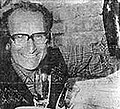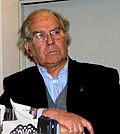Chemistry
Two Latin Americans have been given the Nobel Prize in Chemistry.
| Year | Image | Laureate | Country | Comment |
|---|---|---|---|---|
| 1970 |  | Luis F. Leloir | [3] First Hispanic to win a Nobel Prize in Chemistry | |
| 1995 |  | Mario J. Molina |
The Nobel Prize is an annual, international prize first awarded in 1901 for achievements in Physics, Chemistry, Physiology or Medicine, Literature, and Peace, with an associated prize in Economics awarded since 1969. [1] As of October 2025, Nobel Prizes had been awarded to 965 individuals, [2] of whom 18 were Latin American recipients (1.8% of the 965 individual recipients).
Latin Americans have received awards in four of the six award categories: seven in Peace (35.3% of the Latin recipients), six in Literature (35.3%), three in Physiology or Medicine (17.6%), and two in Chemistry (11.8%). The first Latin American recipient, Carlos Saavedra Lamas, was awarded the Peace Prize in 1936. The most recent, María Corina Machado, was awarded the Peace Prize in 2025.
Among the Latin American laureates, two served as heads of state or government of their respective countries upon receiving the Nobel Prize. Those include Óscar Arias Sánchez of Costa Rica and Juan Manuel Santos of Colombia, who were presidents; both of them were awarded the Peace Prize.
Two Latin Americans have been given the Nobel Prize in Chemistry.
| Year | Image | Laureate | Country | Comment |
|---|---|---|---|---|
| 1970 |  | Luis F. Leloir | [3] First Hispanic to win a Nobel Prize in Chemistry | |
| 1995 |  | Mario J. Molina |
Three Latin Americans have been given the Nobel Prize in Physiology or Medicine.
| Year | Image | Laureate | Country | Comment |
|---|---|---|---|---|
| 1947 |  | Bernardo Alberto Houssay | First Latin American to win a Nobel Prize in Physiology or Medicine | |
| 1980 |  | Baruj Benacerraf | ||
| 1984 |  | César Milstein |
Six Latin Americans have been given the Nobel Prize in Literature.
| Year | Image | Laureate | Country | Comment |
|---|---|---|---|---|
| 1945 |  | Gabriela Mistral | First Latin American to win a Nobel Prize in literature | |
| 1967 |  | Miguel Ángel Asturias | ||
| 1971 |  | Pablo Neruda | ||
| 1982 |  | Gabriel García Márquez | ||
| 1990 |  | Octavio Paz | ||
| 2010 |  | Mario Vargas Llosa |
Seven Latin Americans have been given the Nobel Peace Prize.
| Year | Image | Laureate | Country | Comment |
|---|---|---|---|---|
| 1936 |  | Carlos Saavedra Lamas | First Latin American to win a Nobel Prize, first Hispanic to win a Nobel Peace Prize | |
| 1980 |  | Adolfo Pérez Esquivel | [4] | |
| 1982 |  | Alfonso García Robles | ||
| 1987 |  | Óscar Arias Sánchez | ||
| 1992 |  | Rigoberta Menchú | ||
| 2016 |  | Juan Manuel Santos | ||
| 2025 |  | María Corina Machado | "for her tireless work promoting democratic rights for the people of Venezuela and for her struggle to achieve a just and peaceful transition from dictatorship to democracy." [5] |
An additional award, the Sveriges Riksbank Prize in Economic Sciences in Memory of Alfred Nobel, was established in 1968 by the Bank of Sweden and was first awarded in 1969